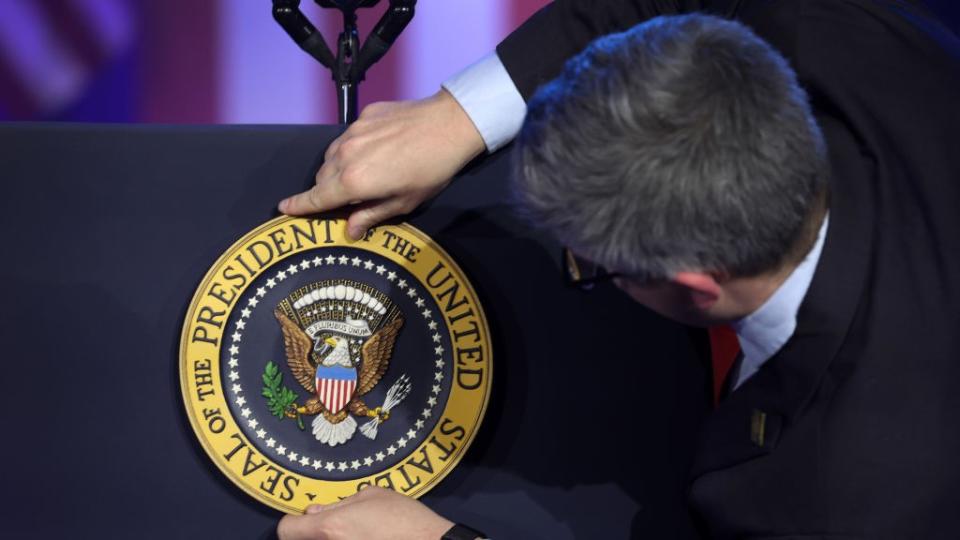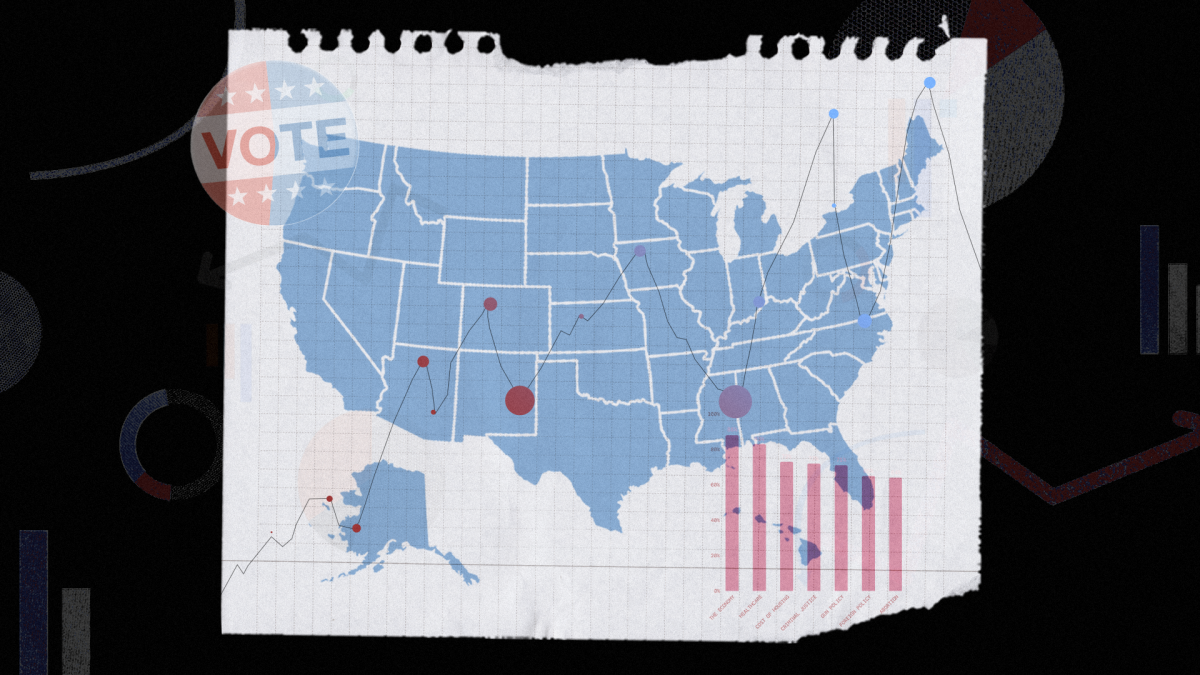When you buy through links on our articles, Future and its syndication partners may earn a commission.

The year of America’s next presidential election is here, which can only mean one thing: speculation will continue to ramp up about who will be the next person to occupy the White House.
A long race originally whittled down to two competitors: President Joe Biden and former President Donald Trump. However, shockwaves were sent throughout the United States when Biden announced on July 21 that he was suspending his campaign and endorsing his vice president, Kamala Harris, to be the Democratic nominee. Biden’s withdrawal from the race made him the first sitting president not to seek reelection since 1968, and allowed Democratic politicians and campaign contributors to throw their support behind Harris, who locked up the required delegates to become the presumptive Democratic nominee just one day after Biden dropped out. She will face Trump in the general election after the former president officially became the GOP nominee at the Republican National Convention in mid-July.
With the election now just two months away, pollsters and political scientists are working to figure out how Biden’s exit from the race — and Harris’ entrance — shakes up the fight over who will win the 270 electoral votes needed for a seat in the Oval Office. Who do the experts believe will be the next president of the United States?
Who do the polls say will win the election?
Donald Trump consistently led in the polls throughout his time facing off against Biden, who, despite a disastrous debate performance against Trump that led to calls for him to step aside as the Democratic candidate, insisted that he was staying in the race. However, the president “came grudgingly to accept that he could not sustain his campaign with poll numbers slipping, donors fleeing and party luminaries pushing him to exit,” said NBC News. In the end, Biden’s poll numbers made for a “no-win situation, a self-fulfilling prophecy,” former White House official Cedric Richmond said to NBC.
But how do Harris’ poll numbers against Trump compare to Biden’s? Overall, much better, as she has been surging in most battleground polls since taking over the nomination, though the race remains tight. Harris is being assisted by polls showing that there is more enthusiasm among Democrats for her candidacy than Biden’s.
An Aug. 28 Suffolk University/USA Today poll of 1,000 adults showed Harris leading Trump 48% to 43%. This is in line with an Aug. 28 Big Village Caravan poll of 1,511 adults that had Harris leading 50% to 43%, and an Aug. 28 Reuters/Ipsos poll of 3,562 voters that had the vice president in front 45% to 41%. It seems more people also trust Harris’ mental capacity over Trump’s; a July 23 Reuters/Ipsos poll of 1,241 adults found that 56% of people thought Harris was “mentally sharp and able to deal with challenges,” compared to only 49% who felt the same way about Trump.
However, while the polls are clearly biding better for Harris against Trump than Biden, the race remains a tight contest that could still go either way. The majority of polls have Harris leading Trump by anywhere from two to three points, which is well within the margin of error for polling. And there also still polls where Trump remains ahead. An Aug. 25 Echelon Insights poll of 1,031 adults had the former president beating Harris 49% to 48%. As in the other cases, though, it was noted that in this poll, the margin of error rounded to zero, meaning that a toss-up was still possible. The race in individual states remains even tighter, as an Aug. 29 Emerson College poll of the seven major battleground states had Trump ahead in Arizona, North Carolina and Wisconsin, while Harris led in Georgia, Michigan and Nevada. The pair were tied in what is perhaps the most crucial battleground state, Pennsylvania.
“Harris’ stronger showing in these later polls is more about her having made up distance on Trump than Biden losing ground,” said ABC News. So while the polls remain close, it appears that for now, Harris has the clear advantage. In FiveThirtyEight’s most recent aggregation, which displayed 22 head-to-head polls, Harris was beating the former president in all of them except for one, and was also tied with him in one. But polls are only a snapshot, and this “doesn’t mean Harris will run notably stronger than Biden, only that she could,” said ABC.
Who do the pundits say will win the election?
Some pundits believed Trump, who gained even more notoriety among his base after surviving an attempted assassination on July 13, would retake the White House against Biden. Others believed Biden would be able to win the election despite low approval ratings — and this mixed bag seems to be translating similarly now that Harris has entered the race. Harris’ “elevation to the top of the ticket would bring new strengths for the Democrats, but it also exposes weaknesses that were less of a concern with Mr. Biden,” Anthony Zurcher said at the BBC.
Harris’ “record as vice president has been mixed. Early in the administration, she was set the task of addressing the root causes of the migration crisis at the U.S.-Mexico border,” said Zurcher. A number of missteps on this front “damaged her standing and opened her to conservative attacks.” Republicans are “already condemning her as the president’s ‘border czar,’ attempting to make her the face of what public opinion polls have found is the Biden administration’s unpopular immigration policies.”
However, the up-and-down nature of the race is a “reminder that the evident Democratic enthusiasm for Harris is not all replicated with voters in the center ground,” Niall Stanage said at The Hill. There is also the large looming question of “whether the nation will elect a Black woman as president,” as while the country elected its first Black man president in 2008, “major female figures — most famously Hillary Clinton in 2016 — have fallen short of expectations, raising questions about the degree to which misogyny remains an electoral burden.”
But despite the recent changes in the competition, there is a “good chance that the new matchup will look strangely familiar, even typical. In fact, it might look much more typical than the old Joe Biden-Donald Trump race,” said Nate Cohn at The New York Times. The Biden-Trump matchup “stopped following the usual script long before what proved to be a fateful debate,” especially since “incumbency is usually an asset to a president seeking reelection. For Mr. Biden, incumbency was a burden.” But “even once we do see a new set of Harris-Trump polls — and we’re in the field already — the race still won’t be especially clear,” Cohn said. A “strong set of polls for Mr. Trump could simply reflect lasting good will in the wake of the assassination attempt and his party’s convention,” and that could eventually disappear, while if Harris takes the lead, one “could say it’s only because she’s benefiting from a wave of endorsements that will soon give way to renewed scrutiny and Republican attacks.”
These factors notwithstanding, the “race is pretty tight, and it looks like it will remain that way until Election Day,” said Nicole Narea at Vox. And it is also notable that while Biden may not be the Democratic candidate anymore, this “doesn’t mean he’s irrelevant: Biden’s approval rating is a proxy for how voters feel about his administration — one whose record Harris has for the most part defended.” This “would be a negative verdict on the incumbent administration,” Kyle Kondik, the managing editor of Sabato’s Crystal Ball at the University of Virginia Center for Politics, said to Vox. Biden’s low rating could prove problematic for Harris because “Republicans are gonna do their damage to connect all of the unpopular things with Biden to Harris,” and it is “just the question of whether it works or not. I don’t think it’s worked yet,” said Kondik.
Who else is in play?
There are other independent candidates who remain in the race, such as Cornel West and Jill Stein. But they are unlikely to prove a real challenge to either Trump or Harris. The most notable third party candidate, Robert F. Kennedy Jr., suspended his campaign in August and endorsed Trump; pundits are mixed on whether this will provide a significant boost to Trump’s campaign, especially given that most polls previously showed Trump would likely have more voters siphoned away as a result of Kennedy’s candidacy than the Democratic candidate. However, questions remain as to how accurate any of the polls will be — and whether they will truly serve as a preview of November.














